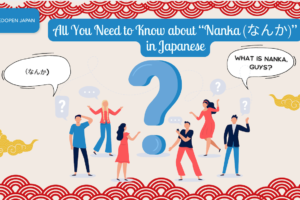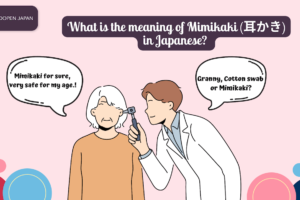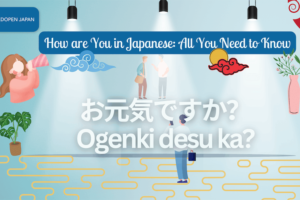皆さん、こんにちは! Hello Everyone. If you pay attention to Japanese conversation, you will have noticed that there are many fixed phrases that are used several times during a conversation. Because these phrases are ubiquitous in everyday life, it’s easy to remember their meaning.
This time I’m going to introduce one of these phrases, which is “daijoubu”. Some of you may already know that we can use “daijoubu” to tell others “I am fine”, which seems to be the most used function of this phrase.
In this article, I will divide the functions of the phrase into six major groups and explain how to use “daijoubu”. In the last part, I will also give you some examples of conversations that you can use in your daily life and at work.
In addition, if you are currently learning various phrases that are very common in everyday Japanese conversation, please also read our interesting discussion on this topic below:
Read also:
What’s the Meaning of “Sasuga” (さすが)?
What’s the Meaning of “Naruhodo (なるほど)”?
The Meaning of Yabai (やばい)
Take a Look Into Daijoubu
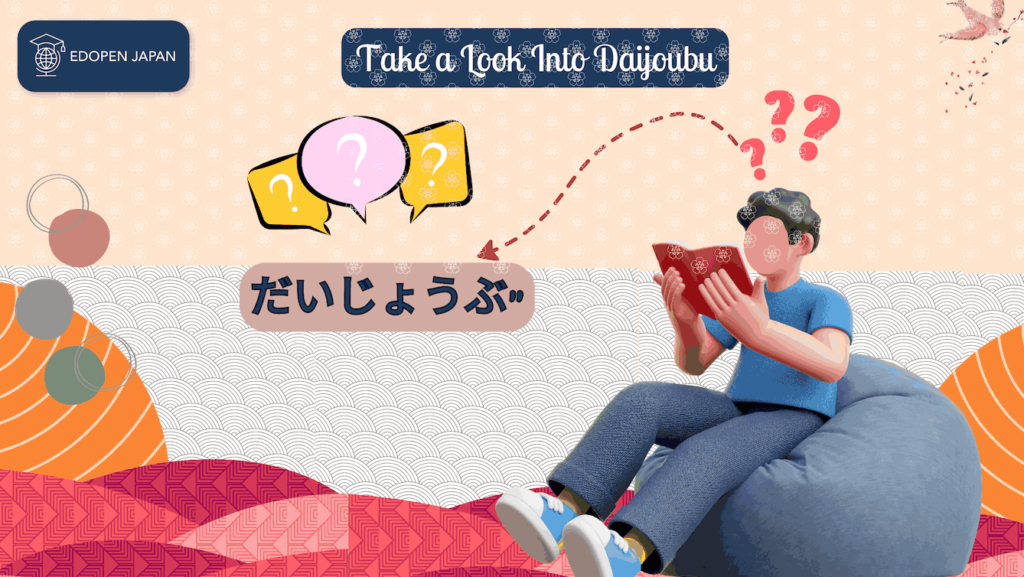
Pronunciation of Daijoubu
Before explaining, let’s look at the pronunciation of “daijoubu”.
The first is in the affirmative informal form.
The second (below) is in informal interrogative form, with the rising intonation at the end.
“Daijoubu” is a phrase usually written in kanji “大丈夫”, the hiragana form of which is “だいじょうぶ”. Depending on the context, this interesting phrase has various meanings that may be beyond your thoughts.
The Etymology of Daijoubu
The Japanese word for “the origin of a word/phrase” is 語源 (gogen). To better understand a world or phrase, it can be helpful to know its origin or history. It also helps to store the words in your long-term memory. Let’s break the phrase into two parts, “大” and “丈夫”.
- 大 (dai) literally means “big”.
- 丈夫 (joubu) in Japanese means something is strong or durable. 丈 (jou) is a measure of length in ancient times. One unit of “jou” is about 180 cm, which is the average height of a man. 夫 (bu) is a noun meaning “man” and “husband”.
As many people know, some of the Kanji have a certain relationship with the Chinese language. In Chinese, “大丈夫” means “a respectable man (in many aspects, such as health, strength, honour, and so on)”. Derived from the Chinese language, according to the Japanese dictionary, “daijoubu” in Japanese mainly has the two meanings below.
(1) A state of being steady and carefree. Being strong and firm.
(2) Without mistakes and sure.
| Affirmative Informal | 大丈夫。 (daijoubu) |
| Affirmative Formal | 大丈夫です。 (daijoubu desu) |
| Informal Interrogative | 大丈夫? (daijoubu?) |
| Formal Interrogative | 大丈夫ですか? (daijoubu desu ka?) |
Classification of “Daijoubu” by Function
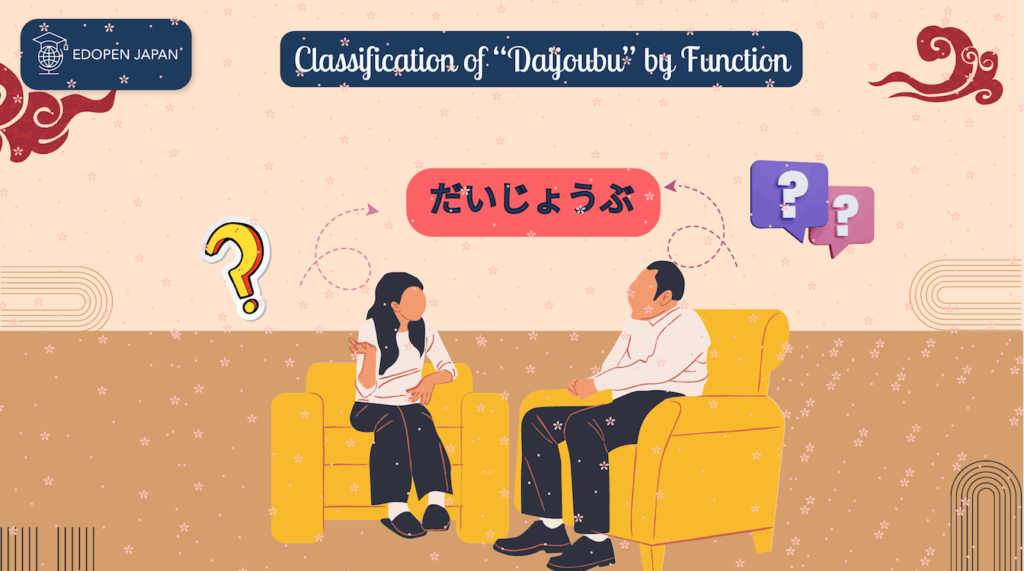
1. Question ー “Are you alright?”, “Is (something) alright?”
If you see someone feeling uncomfortable or meet someone in trouble and want to show your concern or lend a hand, you can ask “大丈夫ですか? (Daijoubu desuka?)”.
- 体調は大丈夫ですか?
Are you feeling good?
(Literal: Is your body feeling good?)
- 顔色悪いですね!大丈夫ですか?
You look pale! Are you okay?
When you want to know if something is going well? Is something in good condition?
- ここまでの説明は大丈夫ですか?
Do you have any question (for the explanation until now) ?
- 天気は大丈夫ですか?
Is the weather good?
- この前の試験大丈夫でした?
How was the test you mentioned last time?
2. Response ー to let others know “you feel alright” or “you think (something) is good”
On the other hand, if you are the one being asked and you think you are fine or can handle it yourself, you can reply with “daijoubu (desu)”.
3. Question ー to confirm & make a request
This phrase is also very useful when you want to make sure of something with others, or when you want to ask for something / permission. In this category, you can write the information you want to know before “daijoubu (desu ka)?”
- 月曜日は大丈夫ですか?
Is Monday okay for you? - 今電話しても大丈夫ですか?
Is it okay to call you now? - このコップを使っても大丈夫ですか?
Is it okay to use this cup?
4. Response to an offer / request from others
The use of “daijoubu” here can be ambiguous for a Japanese beginner, as it can mean either “yes” or “no”, which is quite tricky.
Reject an offer
If someone offers you something, you can say “daijoubu (desu)” to refuse, which means “I don’t need it, thank you” or “I’m fine, thank you”. Of course, there are many other expressions you can use to refuse an offer, such as “結構です (kekkou desu)”, “いりません (irimasen)”, and so on. Compared to other expressions, “daijoubu desu” is a much more polite way of saying no.
- When you buy something, the shopkeeper asks you if you need a plastic bag / join the membership / get a receipt …
- In the restaurant you will be asked if you need more water.
Accept / Confirm a request
However, if someone asks you for something, “daijoubu (desu)” is used to accept the request, meaning “yes, no problem”.
- If you are in the middle of studying or working, someone needs to interrupt you for a while.
- If someone wants to borrow something from you.
5. Responding to the apology of others
There are many unexpected, unintentional accidents and mistakes that happen in everyday life. Imagine someone apologising for…
- Bumping into you in a crowded street.
- Dropping your pen in the classroom.
- Being 10 minutes late.
If you do not see the mistake as a problem, you can say “daijoubu”, which means “It’s OK. Don’t mind.” to forgive them.
6. To encourage others
When your family member or friend is feeling upset, worried, or sad. There are some expressions that use “daijoubu” to tell others that “everything will be alright”.
- 心配しないで、きっと大丈夫ですよ!
Don’t worry! You will be fine!
- ずっとそばにいるから大丈夫!
I will always stay by your side. You will be fine!
Conversations
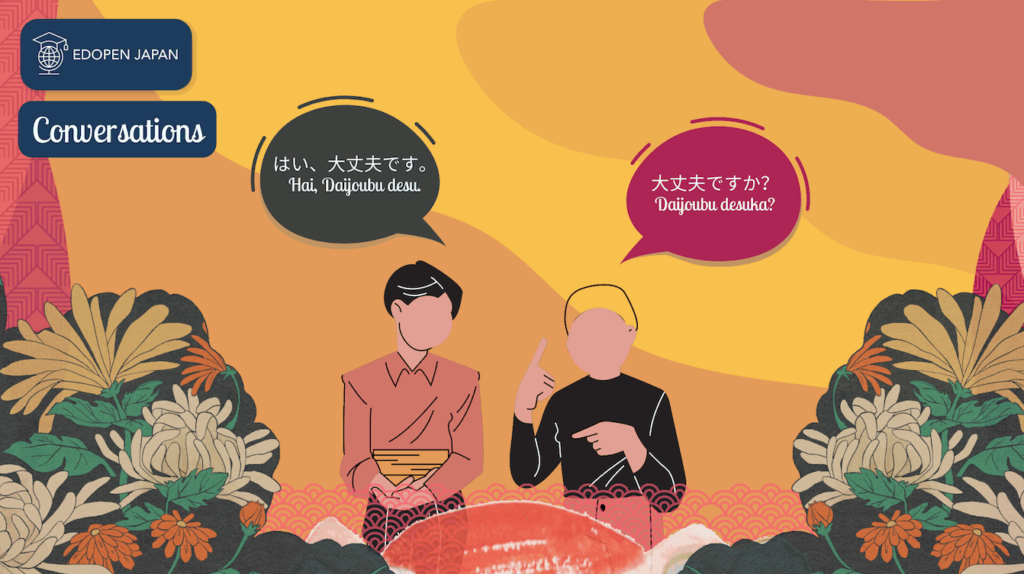
(Sam is absent from today’s class because of a fever. Tom is talking to Sam on the phone.)
Tom: 熱があるって聞いたけど、大丈夫?
I heard that you had a fever. Are you okay?
Sam: さっき薬を飲んだから、もう大丈夫。
I just took the medicine. It’s alright now.
Tom: そうなんだ!お大事に!
I see! Take care!
(Tom is paying in convenience store)
Clerk: 袋はご利用ですか?
Do you need plastic bag?
Tom: 大丈夫です。
No, it’s fine, thank you.
(Tom is discussing with Sam about when to go to amusement park)
Tom: 今週末は大丈夫?
Is this weekend okay for you?
Sam: ごめん、今週末は予定があって、来週末なら大丈夫だよ!
Sorry, I already have plan for this weekend. But I am free on next weekend.
Tom: オーケー!じゃあ、来週の日曜日で!
OK! Then, let’s meet next Sunday!
(In the office)
Tom: 今時間大丈夫ですか?新商品についてですが。
Do you have time now? I’d like to discuss about the new product.
Boss: ごめん、今はちょっと、午後でも大丈夫?
Sorry, I’m in the middle of work right now. Can I we do that this afternoon?
Tom: はい、大丈夫です!
No problem!
(On the phone. Tom and Sam are going to meet later.)
Tom: もう着いた?
Have you arrived there?
Sam: あと10分ぐらいかな。どうしたの?
I will arrive in ten minutes. What happened?
Tom: ごめん、ちょっと電車が遅れてて、30分ぐらいかかりそう。
I’m sorry. The train is delayed, so I will be late for around 30 minutes.
Sam: そうなんだ、私は大丈夫だから、急がなくてもいいからね!
I got it! It’s okay. Take your time.
Summary
Is this the use of “daijoubu” complex for you? 大丈夫ですか?
When you learn a language, it is easy to “understand” the meaning. “Using it in real life is another thing. “Daijoubu” has many meanings in different contexts. After understanding the meaning, the next challenge is to be able to use it in different situations!




